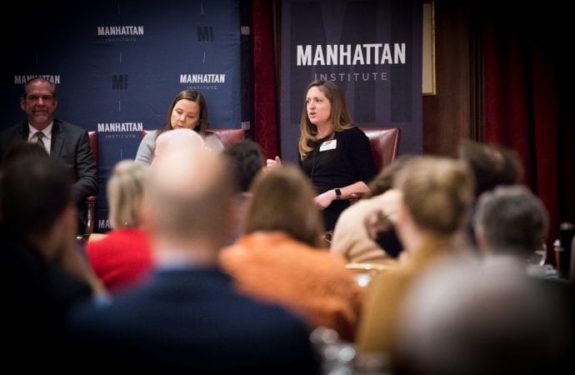
By National Correspondent Christopher White
NEW YORK – A new report claims that values-based education offered by Catholic schools can serve as a model for all schools seeking to reform and to improve the long-term success of their students.
The report, “Catholic On the Inside: Putting Values Back at the Center of Education Reform,” released last week by the Manhattan Institute, states that while debates over school reform have intensified in the last two decades, “values, culture, and beliefs – the inside of a school – have largely taken a backseat to these external, structural changes.”
The Manhattan Institute is a free-market think tank focusing on economic growth, education, energy and environment, health care, legal reform, public sector, race, and urban policy.
The author of the study, Kathleen Porter-Magee, raises the possibility that a commitment to treating “every student as having equal worth before God” may be the “secret sauce” of Catholic schools, which, according to her report, offer a strong track record of success that many advocates of school reform seek to emulate.
Porter-Magee, who serves as superintendent at Partnership Schools in New York, outlines three major elements that she believes to be drivers of the Catholic educational model, but not necessarily visible from the outside: the belief in objective truth, a commitment that all humans are made in the image of God, and a priority on teaching the habits of virtue and the happiness of choosing to do good.
“The focus on academic rigor,” she writes, “is grounded in the belief that truth is objective, and that one goal of education is the search for objective truth.”
As for the core value of belief that students are made in the image of God, she maintains that “this simultaneously demands that we honor our students for who they are and that we strive to bring out the best in them.”
Ultimately, for Porter-Magee, the lesson of Catholic education is that it challenges education reformers to think beyond individual-level achievement as a metric of success and that “by refocusing attention on values, culture, and beliefs, the education reform movement can ensure that the work that we do today will serve students long after they graduate.”
At an event on December 12 on “The Future of Catholic Schools in American Education,” timed to coincide with the report’s release, Ray Domanico, director of education policy at the Manhattan Institute, emphasized that education is not value neutral and that while the Institute is non-religious, since Catholic schools make up the largest group of private schools in the country, they were a logical place to start.
The success of Catholic schools, he argued, offers a public benefit given the number of students – 1.8 million in the United States – that they educate.
Nicole Stelle Garnett, professor of law at the University of Notre Dame, concurred, saying that Catholic schools have been “the most-effective anti-poverty organization devised in the history of the United States,” and that there have been a number of civic effects spurred on by their existence, including safer neighborhoods and greater social cohesion.
Panelist Peter Murphy, senior fellow for education at the Empire Center, spoke of the need for greater school choice, which he said would offer greater access to Catholic or private schools for parents.
“We have an economic problem where working and middle class families, even modestly priced tuition, are having a hard time affording it,” he said, saying that parents need to become more involved in fighting for tax credits or vouchers. “The key to it has to be a sustained political effort to engage lawmakers.”
Porter-Magee, added that “from a simple religious liberty standpoint, we should be fighting hard for school choice and to preserve Catholic schools, and not just for the elite. One of the things that is most tragic…if we don’t act in an innovative way, what’s going to be left is only upper middle class and wealthy people will have the right to educate their children in the faith in Catholic schools.”
Murphy also bristled at the notion that tax credits or vouchers would be using public money to support a religious institution saying that using the private sector to fulfill the public good is standard practice and isn’t privileging religious identity.
“Public money comes from the public and it would go back to the public,” he said.
Garnett added the United States is an outlier in the western, developed world for not having greater options for pluralistic education.
Yet she, along with Porter-Magee, also said that while the push for greater options for school choice takes place, Catholic schools must also embrace greater measures of transparency and accountability when it comes to their results – something that can be difficult for an institution that has often been wary of such efforts.
“If we don’t get on board with transparency,” Garnett warned of Catholic schools, “the government will make us.”
